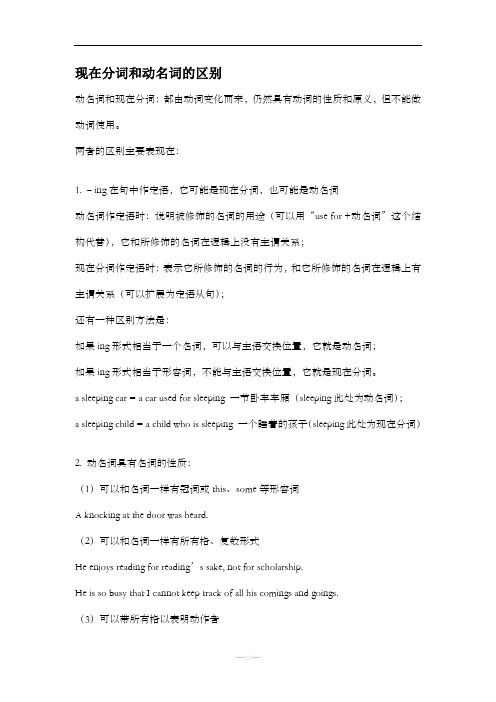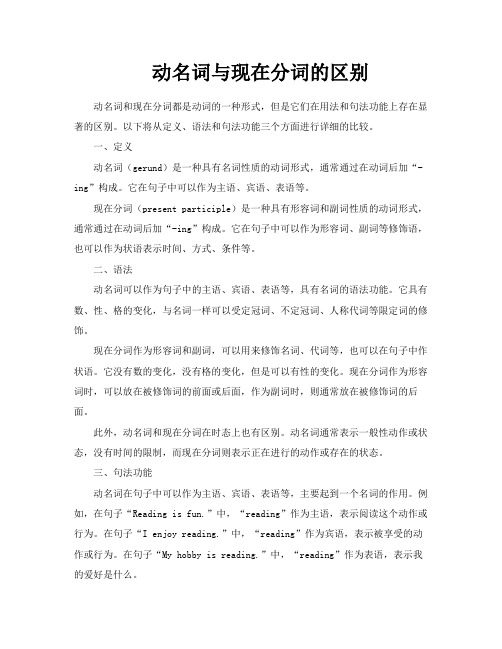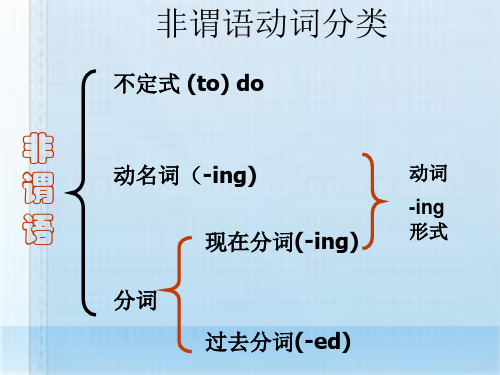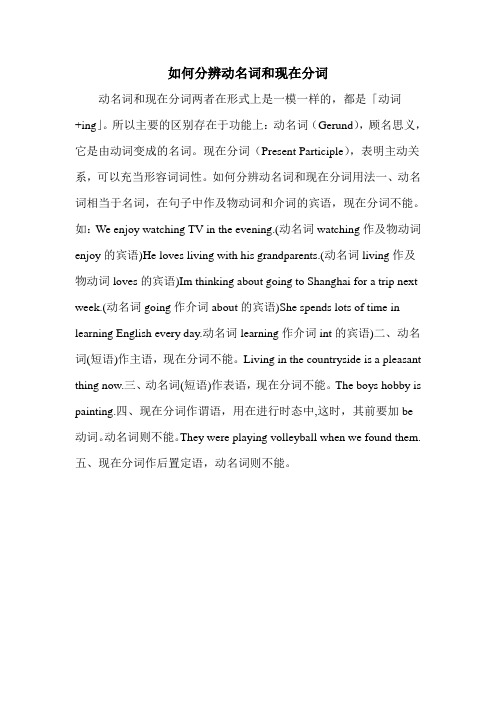现在分词 动名词
动名词和现在分词总结

动名词和现在分词一. 动名词(the Gerund)和现在分词(the Present Participle)都是非谓语动词,在句中不能作谓语。
1.动名词与现在分词的否定要否定在其前面。
动名词:相当于名词。
现在分词:相当于形容词和副词。
3.发现划线部分所做的成分:1)Collecting stamps is interesting. 集邮很有趣。
当动名词短语做主语时常用it作形式主语。
It’s no use crying. 哭是没用的。
2)His hobby is collecting stamps. 他的爱好是集邮。
The present situation is inspiring. 当前的形势鼓舞人心。
He is singing. 他正在唱歌。
3)They haven’t finished building the dam. 他们还没有建好大坝。
We have to prevent the air from being polluted. 我们必须阻止空气被污染。
注:We found it no good making fun of others. 我们发现取笑他人不好。
4)He can’t walk without a walking-stick. 他没有拐杖不能走路。
In the following years he worked even harder.在后来的几年中,他学习更努力了。
The man speaking to the teacher is our monitor’s father.正与老师谈话的那个人是我们班长的父亲。
5)The cave, his hiding-place is secret. 那个山洞,他藏身的地方很秘密。
His habit, listening to the news on the radio remains unchanged.他收听收音机新闻节目的习惯仍未改变。
现在分词和动名词的区别

现在分词和动名词的区别动名词和现在分词:都由动词变化而来,仍然具有动词的性质和原义,但不能做动词使用。
两者的区别主要表现在:1. –ing在句中作定语,它可能是现在分词,也可能是动名词动名词作定语时:说明被修饰的名词的用途(可以用“use for +动名词”这个结构代替),它和所修饰的名词在逻辑上没有主谓关系;现在分词作定语时:表示它所修饰的名词的行为,和它所修饰的名词在逻辑上有主谓关系(可以扩展为定语从句);还有一种区别方法是:如果ing形式相当于一个名词,可以与主语交换位置,它就是动名词;如果ing形式相当于形容词,不能与主语交换位置,它就是现在分词。
a sleeping car = a car used for sleeping 一节卧车车厢(sleeping此处为动名词);a sleeping child = a child who is sleeping 一个睡着的孩子(sleeping此处为现在分词)2. 动名词具有名词的性质:(1)可以和名词一样有冠词或this、some等形容词A knocking at the door was heard.(2)可以和名词一样有所有格、复数形式He enjoys reading for reading’s sake, not for scholarship.He is so busy that I cannot keep track of all his comings and goings.(3)可以带所有格以表明动作者Please excuse my coming late.3. “动名词+名词”和“现在分词+名词”的读音不同“动名词+名词”的重音在“动名词”上(a ‘sleeping suit)“现在分词+名词”的重音在“名词”上(a sleeping ‘child)4. 动名词用法的特殊情况①No+动名词——用于简短的禁令或禁律No smoking=Don’t do=Don’t smoke.②There is no+-ing(…是不可能的)= It is impossible to= No one can (or We cannot) There is no telling when lasting peace will come. 谁也不知道永久的和平何时到来③Never (or not) … without + -ing (每次…都…)= wheneverHe never comes without bringing some present.④It goes without saying that(…是不用说的)= It is needless to say thatIt goes without saying that no animal can live without breathing.⑤Do+动名词(做需要若干时间或一再重复的事情),动名词之前都由the、所有格或some/a little/much/a lot of之类的形容词Do you do much fishing?⑥On (or upon)+动名词(当…, 一…就…)=when (or as soon as)+S.+V.⑦Of one’s own+动名词(自己…的)= -ed by oneselfHe showed me a picture of his own painting.⑧Make a point of+动名词(必定,重视)= make it a point toHe makes a point of calling on me on New Year’s Day.⑨Be on (or upon) the point of + 动名词(正要)= be just about to5. 如果ing形式在句中充当状语和补语,那么它一定是现在分词;如果ing形式在句中充当主语、宾语、同位语,那么它一定是动名词。
动名词与现在分词的区别

动名词与现在分词的区别动名词和现在分词都是动词的一种形式,但是它们在用法和句法功能上存在显著的区别。
以下将从定义、语法和句法功能三个方面进行详细的比较。
一、定义动名词(gerund)是一种具有名词性质的动词形式,通常通过在动词后加“-ing”构成。
它在句子中可以作为主语、宾语、表语等。
现在分词(present participle)是一种具有形容词和副词性质的动词形式,通常通过在动词后加“-ing”构成。
它在句子中可以作为形容词、副词等修饰语,也可以作为状语表示时间、方式、条件等。
二、语法动名词可以作为句子中的主语、宾语、表语等,具有名词的语法功能。
它具有数、性、格的变化,与名词一样可以受定冠词、不定冠词、人称代词等限定词的修饰。
现在分词作为形容词和副词,可以用来修饰名词、代词等,也可以在句子中作状语。
它没有数的变化,没有格的变化,但是可以有性的变化。
现在分词作为形容词时,可以放在被修饰词的前面或后面,作为副词时,则通常放在被修饰词的后面。
此外,动名词和现在分词在时态上也有区别。
动名词通常表示一般性动作或状态,没有时间的限制,而现在分词则表示正在进行的动作或存在的状态。
三、句法功能动名词在句子中可以作为主语、宾语、表语等,主要起到一个名词的作用。
例如,在句子“Reading is fun.”中,“reading”作为主语,表示阅读这个动作或行为。
在句子“I enjoy reading.”中,“reading”作为宾语,表示被享受的动作或行为。
在句子“My hobby is reading.”中,“reading”作为表语,表示我的爱好是什么。
现在分词在句子中主要作为形容词、副词等修饰语,起到一个修饰、描述或说明的作用。
例如,在句子“The dog is running after the ball.”中,“running”作为现在分词作形容词,描述了“dog”的状态。
在句子“While I was reading, she came in.”中,“reading”作为现在分词作状语,表示我正在进行的动作。
动名词与现在分词的区别

11
keep doing sth一直做某事 keep on/up doing sth 坚持做某事
consider doing 考虑做某事 consider to be 认为 to be doing to have done to have been done
12
Charles Babbage is generally considered _________ the first computer. A. to invent B. invented C. to have invented D. having invented
The task is considered ________ (finish).
13
I am sorry, I am too busy. I can’t help ____ the door of your office. A. to sweep B. sweeping C. swept D. to be swept
Rather than ____ on a crowded bus, he always prefers _____ a bicycle. A. ride, ride B. riding ride C. ride, to ride D. to ride, riding
prefer sth to sth prefer doing sth to doing sth prefer to do sth rather than do sth
7
3. doing在句子中充当宾语,往往跟在某些固定动词后。也就是 我们常说的某些固定动词后面再接动词,必须接动词的 -ing形式。 如: Hearing the words, she couldn’t help thinking of her past bitterness. (can’t help这个动词,后面接宾语,如果宾语表达的是动 作,是个动词,那就要把动词变为名词性,即doing。此处doing 为 动名词。) We all avoided mentioning that matter. 同理 ★ 能用动名词作宾语的动词有两类: 一 类 是 后 面 只 能 用 动 名 词 作 宾 语 的 动 词 , 其 中 有 : avoid, consider, dislike, enjoy, escape, finish, give up, can’t help, imagine, keep (on), don’t mind, practise, put off, stop, go on, resist, suggest等, 如: Mary is considering changing her job. I enjoy working with you. 8 Would you mind ringing me up tomorrow?
现在分词和动名词

give up feel like put off
can’t help can’t stand be worth doing be busy (in) doing
have some difficulty / trouble (in) doing
此to 非彼to
look forward to doing sth. (盼望)
t_o_t_u_r_n_(turn )it off.
作主语:动名词
Teaching is my full-time job.
Writing an English composition is not easy.
It’s useless taking this kind of medicine.
有时用it作形式主语,动名词为真正的主语。 常用的结构有: “It is no use/no good/ fun /a waste of time doing sth”表示的意思为“做某事是没有 用的/不好的/有趣的/浪费时间的”
•He keeps buying expensive maps. He must have more th:
admit, advise, allow, appreciate, avoid, complete, consider, delay, deny, dislike, enjoy, escape, excuse, finish, forbid, forgive, imagine, involve, keep, mention, mind, miss, postpone, practice, resist, risk, suggest, permit, prevent, fancy, understand
如何分辨动名词和现在分词

如何分辨动名词和现在分词
动名词和现在分词两者在形式上是一模一样的,都是「动词
+ing」。
所以主要的区别存在于功能上:动名词(Gerund),顾名思义,它是由动词变成的名词。
现在分词(Present Participle),表明主动关系,可以充当形容词词性。
如何分辨动名词和现在分词用法一、动名词相当于名词,在句子中作及物动词和介词的宾语,现在分词不能。
如:We enjoy watching TV in the evening.(动名词watching作及物动词enjoy的宾语)He loves living with his grandparents.(动名词living作及物动词loves的宾语)Im thinking about going to Shanghai for a trip next week.(动名词going作介词about的宾语)She spends lots of time in learning English every day.动名词learning作介词int的宾语)二、动名词(短语)作主语,现在分词不能。
Living in the countryside is a pleasant thing now.三、动名词(短语)作表语,现在分词不能。
The boys hobby is painting.四、现在分词作谓语,用在进行时态中,这时,其前要加be
动词。
动名词则不能。
They were playing volleyball when we found them.
五、现在分词作后置定语,动名词则不能。
动名词和现在分词区别技巧
动名词和现在分词区别技巧1. 哎呀,你知道动名词和现在分词咋区分不?看这里哦!动名词主要是当名词使呀,就像“Swimming is my favorite sport.”这里的“swimming”就是动名词,它在这就相当于一项运动。
而现在分词更多是表示动作正在进行呢,比如“He is running fast.”中“running”就是现在分词,表示正在跑的动作呀。
懂了吧!2. 嘿,想想看呀,动名词不就像是一个安静的“角色”,稳稳地在那发挥名词的作用,例如“Eating too much is bad for health.”中的“eating”。
可现在分词呢,像是个活跃的“小精灵”,展示着正在进行的动态,像“I saw him dancing in the room.”里的“dancing”,是不是很形象呀!3. 哇塞,动名词和现在分词的区别可太关键啦!动名词像个“幕后工作者”,默默担任着名词的任务,像“Teaching is a noble profession.”中的“teaching”。
现在分词呢,则像个“显眼包”,在那强调动作正在进行呀,好比“She is singing a song loudly.”中的“singing”,清楚了不?4. 你瞧呀,动名词是表示某种事情或行为呢,比如“Doing homework is necessary.”里的“doing”。
而现在分词就是在告诉你动作正在进行哟,像“They are playing football in the field.”中的“playing”,这么说理解起来不难吧!5. 哎呀呀,动名词和现在分词区分起来其实也没那么难嘛!动名词常常在句子里充当一些稳定的角色,像“Walking after dinner is good for health.”里的“walking”。
但现在分词就不一样啦,它强调正在干着啥呢,例如“Look! He is writing a letter.”中的“writing”,是不是挺容易区分呀!6. 嘿哟,动名词和现在分词?动名词就如同一个安静的“存在”,像“I enjoy reading books.”中的“reading”。
现在分词与动名词的区别
现在分词与动名词的区别现在分词与动名词统称为-ing 形式,但在意义和用法上还是有一些区别。
掌握这些细微的区别,对于准确理解句子的意思还是有帮助的。
一、现在分词的基本用法分词的用法主要要掌握三点:1、分词已经转化为形容词,强调事物的某个特点。
例如:He is a promising young man. 他是一个有前途的年轻人。
What you said is really inspiring. 你所说的真令从鼓舞。
2、分词(包括分词短语) 仍然保留的正在进行时的特点,侧重于正在进行的特点。
例如:Make less noise. There’s a sleeping child. 声音小点,有个孩子正在睡觉。
The young man sitting between John and Mary is the editorof the campus newspaper.坐在约翰和玛丽之间的那个年轻小伙子是校园报的编辑。
Those wishing to join this club should sign here.(正在)想加入本俱乐部的人在这里签名。
The man, having been disturbed so badly, almost lost his memory.由于正被严重困扰,这个人几乎失去了记忆。
Any one having passed the test has got a prize. 任何通过考试的人都能得到一份奖品。
I sometimes hear a girl singing downstairs. 有时我听到楼下有一个小姑娘在唱歌。
3、分词短语相当于一个状语从句。
Arriving in Paris, I lost my way. 到了巴黎的时候,我迷了路。
(时间)When crossing the street,do be careful. 过马路时要小心。
Having lived in London for years, I almostk now every place quite well.在伦敦住过多年,我几乎对每个地方都很熟悉。
英语中动名词和现在分词的区别
动名词和现在分词都是由动词转换而来的,有一样的形式 V+ing,且都是非限定动词的一种,然而它们有不同的用法。
一、概念特征不同1、动名词,指的是动词ing形式的一种,兼有动词和名词特征的非限定动词,在句子里面不能单独充当谓语,但能在句中充当主语,宾语,表语和定语,可以支配宾语,也可以被副词修饰,有时态和语态的变化。
2、现在分词,又称-ing形式或现在进行时,是分词的一种,兼具动词和形容词特征的非限定动词,在句子里面不能单独充当谓语,但能在句中充当定语,表语,补语和状语,有时态和语态的变化。
二、功能不同1、动名词能在句中充当主语,宾语,而现在分词不能,例如:A、动名词作主语Brushing your teeth is important.刷牙很重要。
Hunting tigers is dangerous.猎杀老虎是危险的。
Flying makes me nervous.飞行使我紧张。
Smoking causes lung cancer.吸烟会导致肺癌。
B、动名词作宾语When will you give up smoking?你什么时候戒烟?She always puts off going to the dentist.她总是推迟去看牙医。
I look forward to hearing from you soon.我期待很快收到你的来信。
I am used to waiting for buses.我习惯等公共汽车。
2、现在分词能在句中充当补语和状语,而动名词不能,例如:A、现在分词作宾语补足语I heard someone singing.我听到有人在唱歌。
He saw his friend walking along the road.他看见他的朋友沿路走。
I can smell something burning!我闻到有东西烧焦了!I watched the birds flying away.我看着鸟儿飞走了。
现在分词和动名词的区别
现在分词和动名词的区别动名词和现在分词:都称作动状词(Verbal),即由动词变化而来,仍然具有动词的性质与原义,但不能作动词使用的词。
动名词与现在分词的区别主要是:-ing形式在句中作定语,它可能是现在分词,也可能是动名词。
区别方法是:●动名词作定语时:说明被修饰的名词的用途(可以用"use for +动名词"这个结构代替),●它和所修饰的名词在逻辑上没有主谓关系;●现在分词作定语时:表示它所修饰的名词的行为,和它所修饰的名词在逻辑上有主谓关系(可以扩展为定语从句);还有一种区别方法是:如果ing形式相当于一个名词,可以与主语交换位置,它就是动名词。
如果-ing形式相当于形容词,不能与主语交换位置,它就是现在分词。
a sleeping car = a car used for sleeping 一节卧车车厢(sleeping 此处为动名词)a sleeping child =a child who is sleeping 一个睡着的孩子(sleeping 此处为现在分词)2.动名词具有名词的性质:(1)可以和名词一样有冠词或this、some等形容词;A knocking at the door was heard(2)可以和名词一样有所有格、复数形式;He enjoys reading forreading’s sake, not for scholarship.He is so busy that I can’t keep track of all his comings and goings.(3)可以带有所有格已表明动作者。
Please excuse my coming late.3. “动名词+名词”和“现在分词+名词”的读音不同,“动名词+名词”的重音在“动名词”上(a ‘sleepingsuit),“现在分词+名词”的重音在“名词”上(a sleeping ‘child)。
- 1、下载文档前请自行甄别文档内容的完整性,平台不提供额外的编辑、内容补充、找答案等附加服务。
- 2、"仅部分预览"的文档,不可在线预览部分如存在完整性等问题,可反馈申请退款(可完整预览的文档不适用该条件!)。
- 3、如文档侵犯您的权益,请联系客服反馈,我们会尽快为您处理(人工客服工作时间:9:00-18:30)。
现在分词;动名词(1)作主语:Seeing is believing. 百闻不如一见。
Talking is easier than doing. 说比做容易。
作主语时,如果其结构较长,可用it作形式主语,而将作主语的-ing后置。
如:It isn’t much good writing to them again.It’s no use waiting here.(2)作表语:Her job is washing and cooking. My hobby is collecting stamps.(3)作宾语:①作及物动词的宾语。
She likes drawing very much.;②作某些短语动词的宾语。
Mary is thinking of going back to New York.;③ do+限定词(my, some, any, the等)+ -ing,表示―做…事‖之意,如:We often do our cleaning on Saturday afternoon.Will you do any shopping on Saturday this afternoon?④作介词的宾语:Her sister is good at learning physics.;⑤作形容词worth, busy等的宾语:This book is well worth reading.⑥–ing作宾语带有宾语补足语时,要用it作为形式宾语,而将作宾语的-ing后置,如:We found it no good talking like that.Do you think it necessary trying again?(4)作定语:The sleeping child is only five years old.Do you know the man standing at the gate?(5)作宾语补足语:We can see steam rising from the wet clothes.可以带有这种复合宾语的动词有see, watch, hear, observe, feel, find, have, keep等。
(6)作状语:①时间状语:Seeing Tom, I couldn’t help thinking of his brother.When crossing street, you must be careful.②原因状语:Being ill, he didn’t go to school yesterday.③方式或伴随状语:Mary stood at the school gate waiting for Betty.3、主动语态-ing完成式的基本用法。
Having answered the letter, she went on to read an English novel.4、被动语态-ing一般式的基本用法。
The truck being repaired there is ours.5、被动语态-ing完成式的基本用法。
Having been shown the lab, we were taken to see the library.6、-ing形式的复合结构。
Your smoking and drinking too much will do harm to your health.7、-ing形式与动词不定式在句中作主语、表语、宾语时的区别。
Our job is making steel.She likes playing the piano, but she doesn't want to play it today.8、-ing形式与动词不定式在句中作定语的区别。
The girl writing a letter there can speak English very well.I have three letters to write.9、-ing形式与动词不定式在作宾语补足语时的区别。
I have told them to come again tomorrow.I hear her singing in the room. 我听见她正在屋里唱歌。
I hear her sing in the room. 我听见她在屋里唱过歌。
10、-ing形式与动词不定式在句中作状语的区别。
Not receiving his letter, I wrote to him again.I looked into the window to see what was going on inside.过去分词过去分词的基本用法:(1)作定语:The stolen car was found by the police last week.The trees planted last year are growing well.(2)作表语:The glass was broken by my little brother.He was satisfied with what she had done.(3)作宾语补足语:When I opened the door, I found the ground covered by fallen leaves.I had my bike repaired yesterday.(4)作状语:Seen from the hill (= When seen from the hill), our town looks beautiful.;Given more time(= If given more time), we could have done it better.( 5 ) 独立主格:The work having been finished, she sat down to have a rest.The meeting (being) over, all left the room.She read the letter, tears rolling down her cheeks.She read the letter with tears rolling down her cheeks.Exercises1. Alien said that his trip was _______.A. interestedB. interestC. interestingD. of interest2. We can't understand ______ a decision until it is too late.A. him to postpone to makeB. his postponing to makeC. him to postpone makingD. his postponing making3. I couldn't understand ______ at the poor child.A. you to laughB. you laughC. why laughD. you laughing4. It's no use______ with him. You might as well ______ with a stone wall.A. arguing, argueB. to argue, arguingC. arguing, arguingD. to argue, argue5. It is no good ______ today's work for tomorrow.A. to leaveB. leavingC. that you leaveD. leave6. The old man's ______ pity on the snake led to his own death.A. takeB. takingC. being takenD. have7. It's very kind ______ you ______ say so.A. of, toB. for, toC. to, toD. of, /8. Some people's greatest pleasure is ______ .A. fishingB. to fishC. to be fishD. being fishing9. Remember ______ the book, when you have finished it.A. putting backB. having put backC. to put backD. will put back10. You didn't hear us come back last night. That's good. We tried ______ noisy.A. to not beB. not to beC. being notD. not being11. Though he failed, he tried _______ it again and again.A. to doB. doingC. doD. done.12. You'll regret ______ those words. You may hurt her feelings.A. sayB. to sayC. having saidD. to have said13. You can keep the book until you ______ .A. have finished readingB. finish to readC. will finish readingD. have finished to read14. We are looking forward to ______ another chance ______ it again.A. be given, to tryB. give, to try .C. giving, tryingD. having, to try15. Most of the students enjoy_____ stamps.A. collectB. to collectC. collectingD. collected16. Excuse me for _____ in without ______.A. coming, askingB. coming, being askedC. to come, askingD. to come, being asked17. People couldn't help ______ the foolish girl.A. laugh atB. to laugh atC. laughing atD. laughing :18. "What do you think of the book?" "Oh. excellent, it's worth _______ a second time."A. to readB. to be readC. readingD. being read19. "I usually go there by train." "Why not ______ by boat for a change?"A. to try goingB. trying to goC. to try and goD. try going20. I was too excited ______ .A. speakB. to speakC. not to speakD. speaking21. Charles Babbage is generally considered ______ the first computer.A. to inventB. inventingC. to have inventedD. having invented22. It is no use _____to come now. He is busy.A. ask himB. to ask himC. that you ask himD. asking him23. The murder was brought in, with his hands _______ behind his back.A. being tiedB. having tiedC. to be tiedD. tied24. Mrs Smith warned her daughter ____ after drinking.A. never to driveB. to never driveC. never drivingD. never drive.25. The computer centre, ______ last year is very popular among the students in this school.A. openB. openingC. having openedD. opened.26. Do you know the boy _______ under the big tree?A. layB. lainC. layingD. lying27. Most of the artists ______ to the party 'were from South Africa.A. invitedB. to inviteC. being invitedD. had been invited28. English is a language ______ in many countries.A. spokenB. speakingC. be spokenD. to speak29. "Can you read?" Mary said to the notice.A. angrily, pointingB. and point angrilyC. angrily, pointedD. and angrily pointing30. There was a terrible noise _______ the sudden burst of Tight.A. followedB. followingC. to be followedD. being followed31. ____ more attention, the trees could have grown better.A. GivenB. To giveC. GivingD. Having given32. _____their students, the famous teacher came into the hall.A. FollowedB. Followed byC. Being followedD. Having been followed33. Your flat needs _____ . Would you like me it for you?A. to clean, to doB. cleaning, doingC. cleaning, to doD. to be cleaned, doing34. Does your new secretary ____ short hand?A. know to takeB. know how to takeC. know how takeD. know how taking35. Tommy had his big brother _____ his shoes for him.A. to tieB. tieC. tiedD. tying36. Would you please ______ write on the textbooks?A. don'tB. not toC. notD. to not37. I'd ______ the operation unless it is absolutely necessary.A. rather not haveB. rather not to haveC. not rather hadD. rather not having38. Your mother and I are looking forward________ you.A. of seeingB. for seeingC. to seeD. to seeing39. The girl couldn't_____ how red his face was.A. help to noticeB. be helping to noticeC. be helping noticingD. help noticing40. Excuse me, but it is time to have your temperature ______.A. takingB. to takeC. takeD. taken41. There is no question of _____ able to finish it himself.A. Tom wasB. Tom's beingC. Tom's beD. Tom is42. The new shopping center _____ now will be put into use by the end of this year.A. builtB. be builtC. being builtD. to be built43. "Have you had supper?" "Not yet. The meal_____."A. are being cookedB. is being cookedC. is cookedD. are cooked44. "I'm glad ______ you here in the hotel." "It's my great pleasure to have you ______ us."A. meeting, toB. to have met, withC. having met, amongD. to meet, of45. I'm afraid I can't make myself _____ in English.A. understandingB. understandC. to be understoodD. understood46. Although in a hurry, Wilson ______.A. couldn't stop walkingB. couldn't help the strangerC. stopped to help the strangerD. didn't answer the stranger47. Janet is easy _____.A. for getting along withB. by getting along withC. to get along withD. got along with48. Don't forget ______ the light when you leave.A. turn offB. to turn offC. turning offD. turned off49. The mother is very glad; her baby is beginning ______.A. understanding what she meansB. to understand that she meantC. to understand what she meansD. noticing what she means ,50. I think this story is _____ .A. worth being readB. worth readingC. worth to readD. worth of reading51. This scientist is a man ______ praise.A. worth toB. worthy to beC. worthy ofD. worth52. I don't want ______ any more trouble, you see?A. there beingB. it to beC. it beingD. there to be53. When she returned home, she found the window open and something ______.A. stealingB. missedC. stolenD. to steal54. Strictly _____, it isn't worth the price you are asking.A. to speakB. speakingC. speakD. spoken55. Time ______, they'll come here to watch us ______ football.A. permitted, playingB. permitted, to playC. permitting, playD. permitting, to play56. The man was seen _____ into the courtyard.A, stealing B. stolen C. be stealing D. had stolen57. Bob should love _____ to the party tomorrow evening.A. takingB. to be takenC. to takeD. being taken58. Tom had no choice but _____ the classroom with his classmates.A. to cleanB. cleanC. cleaningD. cleans59. Mr. Brown said that his car neededA. to be repairedB. being repairedC. be repairingD. to repair60. The old man didn't know whether to sell the car or____ .A. being kept for later useB. kept for later useC. to keep it for later useD. to be kept it for later use61. The noise of the desks _____ could be heard in the next classroom.A. being opened and closedB. opened and closedC. having been opened and closedD. to be opened and closed62. I remember _____ someone ____ the umbrella away.A. to see, takeB. having seen, to takeC. to see, to takeD. having seen, take63. She was noticed ______ the shop.A. to enterB. enterC. having enteredD. entered64. I couldn't help _____ when I heard the joke.A. being laughedB. laughingC. to be laughingD. to laugh65._____, she burst into tears.A. Deeply movedB. Deeply movingC. As she deeply movedD. As she was deeply moving66. The problem requires ______.A. studying with great careB. to study carefullyC. to be studied without carelessnessD. taking great care of studying it67. _____ carelessly, the boy made mistakes here and there. .A. being writtenB. WroteC. WriteD. Writing68. He would rather ______ his parents with their housework than _____ out to play games.A. to help, to goB. help, goC. help, to goD. to help, go69. The boy had his leg _____ while ____ football.A. broken, playingB. break, playC. broken, playedD. broke, was playing70. Having finished the work,_____.A. it was almost six o'clockB. a postman came and delivered the evening paperC. supper had been already preparedD. we had a rest and then had supper71. He is ill. He has kept_____.A. coughing all alongB. to cough at nightC. cough since yesterdayD. being coughed day and night72. It is no use ____ without _____.A. to talk, doingB. taking, being doneC. talking, doingD. being talked, being to do73. "I usually go there by boat." "Why not _____ by train for a change?"A. try goingB. to try goingC. trying to goD. to try and go74._____, she felt quite shy at the party.A. As she a strangerB. Being a strangerC. According to a strangerD. She like a stranger75. Every morning he gets up early and practises ______ and then _____ to school.A. to read English, goB. reading English, goingC. reading English, goesD. of reading English, goes76. While _____ football on tin playground, I found 'my keys ______.A. playing, lostB. play, losingC. played, being lostD. having played, lost77. ____ the same mistakes again made his parents very angry.A. His having madeB. He has madeC. He had makingD. Him making78. Dick made it ______ to all his friends.A. to knowB. knownC. knowD. knowing79. Anna spends one hour a day _____ spoken English.A. practiseB. to practiseC. on practisingD. in practising80. No one was surprised at _____ the examination.A. he passingB. his passC. him passD. his passing81. Although swimming is his favourite sport, yet he doesn't like _____ today.A. to swimB. swimmingC. swimD. to have swim82. She sat at the desk and set about _____ a letter to her friend.A. to writeB. writingC. writeD. written83. This soup is cold; it needs _____.A. to heatB. to be heatedC. being hotD. heated84. I went ______a balloon but I didn't see anyone _____ balloons.A. to buy, to sellB. to buy, sellingC. buying, sellingD. buying, to sell85. Anna is often heard ______songs in her room.A. sungB. singingC. singD. to sing86. The more you practise ______ English, the better your _____ English will be.A. to speak, speakingB. speaking, spokenC. spoken, spokenD. spoken, speaking87.Time ______ , I can have done it better.A.permit B.permitted C.permitting D.to permit88.When ______ that it was getting late, I put off the light and went to bed.A.find B.finding C.found D.founded89.If ___ green, the door might look more beautiful.A.paint B.painted C.painting D.to paint90.Please leave the door ______, as it's hot here.A.open B.opened C.being opened D.to be opened91.Some countries in the Southeast Asia are ______ _ countries.A.newly----developB.newly----developedC.newly----developingD.newly----development92.Everything was out of order in the ______ shop.A.robbedB.robC.robbingD.have robbed93.This is a ______ movie and everyone was ______ _.A.moved, moving B.moved, moved C.moving, moved D.moving, moving94.They are very ______ to see her ___ face.A.pleasing, smiled B.pleasing, smiling C.pleased, smiled D.pleased, smiling95.The listeners got ______ _ at the ______ speech by the famous scientist.A.exciting, excited B.exciting, exciting C.excited, excited D.excited, exciting96.I'm very glad to see the problem ______ .A.settle B.settled C.being settled D.settling97.I'm sorry to have kept you ______ so long a time.A.wait B.to wait C.waited D.waiting98.______ the rain had stopped, he left his raincoat at home.A.Seeing B.To see C.Seen D.See99.----Can I help you? ----I want the letter ______ at once.A.typed B.being typed C.type D.typing100.When he got home, he found his pocket ______ open and his wallet ______.A.cut, stealing B.cut, stolen C.cutting, stealing D.cutting, stolen101.My father encouraged me in my painting, but never liked to see any of my works ______ in public.A.exhibiting B.exhibited C.having exhibited D.being exhibited102.Thousands of peasants are up into the city ______ vegetables, fruit and some other things every day.A.sellB.sellingC.soldD.to be selling103.The teacher entered classroom, ______ by a group of children.A.having followedB.followingC.having been followedD.followed104.The old farmer had his leg ______ but he had his tractors ______ _ day and night.A.hurting, workingB.hurting, workedC.hurt, workingD.hurt, worked105.Linda can't attend the party ______ at Tom's house at present because she is preparing a speech for the party ______ at Marie's house tommorrow.A.being held, to be heldB.to be held, heldC.held, being heldD.to be held, to be held106.―We must keep a secret the things ____ here .‖the general said, staring at the men charge of the information office.A.discussed, staredB.discuss, staringC.being discussed, staredD.being discussed, staringKEY:1~5 CDDAB 6~10 BAACB 11~15 BCADC 16~20 BCCDB21~25 CDDAD 26~30 DAAAB 31~35 ABCBB 36~40 CADDD41~45 BCBBD 46~50 CCBCB 51~55 CDCBC 56~60 ABAAC61~65 ADABA 66~70 ADBAD 71~75 ACABC 76~80 AABDD81~85 ABBBD 86—90 BCBBA 91—95 BACDD 96-100 BDAAB101-106 B BDCAD。
